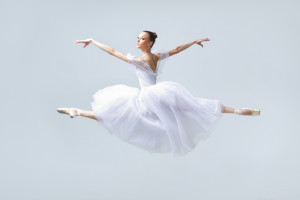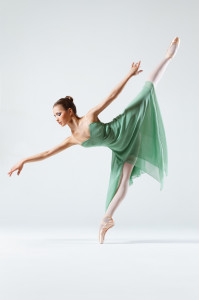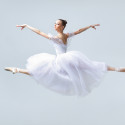Several years ago I conducted my first full ballet—Sleeping Beauty. At the time, the considerable growth I experienced by accepting this role was a bit foggy. I was so fully engaged in simultaneously capturing the beauty of the music and the dancers that it took some time to sort it all out. But the experience led me to know deep down that this was something special that I would build on for the rest of my life.

The sounds, feelings, and visual images are still ingrained in my body, heart, and mind and it has now become easier to find my voice. When you fully engage in an experience like this, what you learn doesn’t solidify until you have gone through and put yourself in the thick of it—had trials and errors—and had enough time for reflection. Before the rehearsal I was standing right there next to the dancers and I was stunned at my response. Was it the movement or was there something else?
I was choked up. I couldn’t speak. Tears started to roll down my face. What was the matter with me? It felt so authentic, honest, and real. I realized my natural response wasn’t about the athleticism or the physical beauty and grace of the body for its own sake, but rather the body and its capacity for movement and communication. It was dynamic and came from an ease and sense of freedom that most of us never have an opportunity to experience. This ease allowed the dancers to be vulnerable and fully expressive with their bodies.
Freedom to a dancer means discipline. That is what technique is for—liberation.
~ Martha Graham
 As I think about it now, I’m reminded of an Agnes de Mille comment—Bodies never lie. It takes years of demanding physical and mental effort for dancers to reach the high level of technical level proficiency that frees them and allows them to move in a way that connects them emotionally with their audiences. While the discipline of developing technique—the daily hour after hour routine of preparation—might seem tedious, it is exactly that which allows them to be fully present in the moment, not having the restriction of having to think about every move.
As I think about it now, I’m reminded of an Agnes de Mille comment—Bodies never lie. It takes years of demanding physical and mental effort for dancers to reach the high level of technical level proficiency that frees them and allows them to move in a way that connects them emotionally with their audiences. While the discipline of developing technique—the daily hour after hour routine of preparation—might seem tedious, it is exactly that which allows them to be fully present in the moment, not having the restriction of having to think about every move.
I now understand in greater depth than ever the importance of experience, practice, feedback, and self-reflection in everything we do—the freedom to participate more fully in life. The arts teach that you can’t learn how to live your life, contribute as an effective leader in your community, or be an educator who takes the ordinary and makes it extraordinary simply by reading a book. In order to live life more fully and contribute effectively to society, we must participate fully, be vulnerable, and freely connect our hearts, minds, and bodies, facing each other and the future with understanding and awareness.
-Pat Hoy
